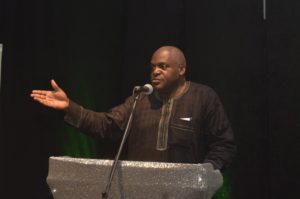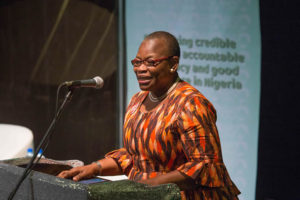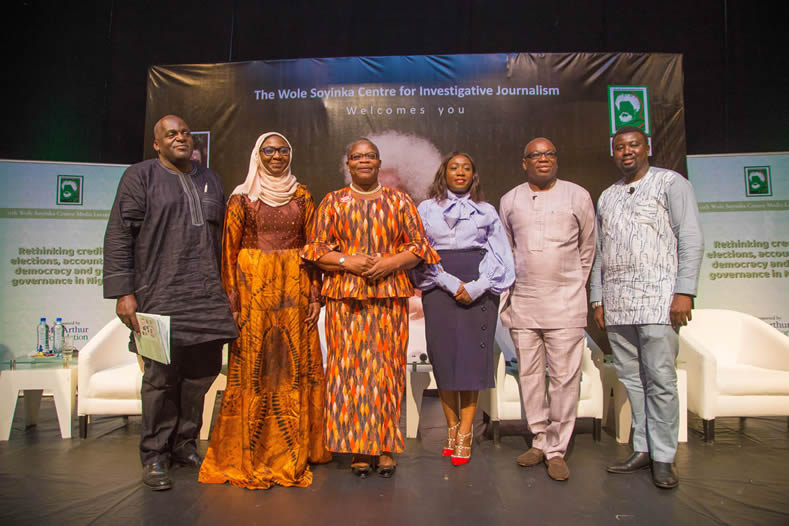Journalists have been urged to ensure that their reports are more data and evidence-based.
The Editorial Chair of Nigeria Info, Rotimi Sankore made the call at the 11th Wole Soyinka Media Lecture Series to mark the 85th birthday of Nobel laureate, Professor Wole Soyinka.
Sankore was one of the discussants at the Lecture organized by the Wole Soyinka Centre for Investigative Journalism, which had the Senior Economic Adviser of Africa Economic Development Policy Initiative, ( AEDPI) Dr Oby Ezekwesili as the Keynote speaker.
Oluwole Osaze-Uzzi, Director, Voter Education and Publicity, Independent National Electoral Commission (INEC, Amina Salihu, Senior Programme Officer, MacArthur Foundation and Gbenga Sesan, Executive Director, Paradigm Initiative were the other discussants on the theme: Rethinking credible elections, accountable democracy & good governance in Nigeria.
According to Sankore, the media should interrogate the claims by government officials based on available data and evidence which can be easily accessed instead of allowing them to make false assertions.

Instead of complicating the problems of the country by adding to it through lack of understanding of critical issues, he said the media should provide solutions.
“The role of the media is to report factually and truthfully. The media also has a role to educate and solve problems. The media should not contribute to the problems”
He cited instances relating to conflicts in the northern parts of the country, health, education and the Rural Grazing Area (RUGA), as an example of how the lack of in-depth reporting, verification of facts and deployment of evidence by the media have denied the people the opportunity to engage issues appropriately.
Sankore noted that establishments of cattle ranches are not new in the country and cited the popular Obudu Cattle Ranch in Cross Rivers state which has existed long before now.
He said herdsmen exist in various parts of the world like in the United States where there are Cowboys who are the original herdsmen who carry guns.
He noted that lack of preparation for the shrinking of the Lake Chad resulted in the collapse of fishing and farming and has led to mass unemployment contributing to the spread of Boko Haram insurgency.
“Could it be that Lake Chad is the major cause of most of the herdsmen crisis that we are presently facing in Nigeria?
“The struggle for land and water is what happens because of poor government policies,” he said.
Sankore said it is unfortunate that the media is not paying attention to what is really important, noting that “the media have to play a much, much better role in the governance and accountability “
Head of the MacArthur Foundation office in Nigeria, Dr Kole Shettima also stressed the need for investigative journalism to improve the quality of life and keep the government on its toes.
Ezekwesili, former Minister of Education in his address called for value-based leadership to ensure good governance in the country. 
“If we are lacking in the building of those values and the shaping of those values, then we will have to wait endlessly. The people who should win our vote should be people with values and character. Age should not just be the determinant of the people who should lead us; it should be age plus values.
“Citizens have abandoned politics in the hands of politicians. So, our political parties have become a venture of political entrepreneurs. It cannot work that way. Political parties are supposed to be the government in waiting,” she stated.
Oluwole Osaze-Uzzi in his response to the keynote address explained that the citizens should go beyond thinking and rethinking elections, to acting to see the change they seek.
He urged stakeholders to begin to focus on the electoral process in terms of voter registration, technology and infrastructure, the registration of political parties and other determinants of successful elections.
Amina Salihu, Senior Programme Officer, called for gender-based affirmative action in governance.
She maintained that women have been “minoritised” because although they are half the population their voices have been diminished.
Speaking of appropriate technology for elections, the Executive Director, Paradigm Initiative, explained that technology hardly needs to be sophisticated and expensive.
According to Sesan, INEC should have sent text messages to its over 80 million registered voters when the 2019 election was postponed just a few hours before the 2019 Presidential elections.
He charged the Commission to take advantage of technology to educate the technology savvy new generation of voters including the additional 20 million plus youth who will be eligible to vote by 2020.
The son of the celebrant, Olaokun Soyinka, thanked the WSCIJ on behalf of the family for the consistency that has brought the lecture to its 11th edition and its focus on promoting the culture of investigative reporting.
He observed that Soyinka’s struggle to hold power accountable and fight against impunity are still relevant today and admonished young people to draw the line between those who are prodemocracy and those who are not.
Motunrayo Alaka, WSCIJ’s Coordinator appreciated the speakers and panellists, the WSCIJ board, WSCIJ staff, her family, the media, Wole Soyinka and his children. She noted that it has taken the support of all the relevant stakeholders to keep the lecture on the same date, Wole Soyinka’s birthday for ten years.


